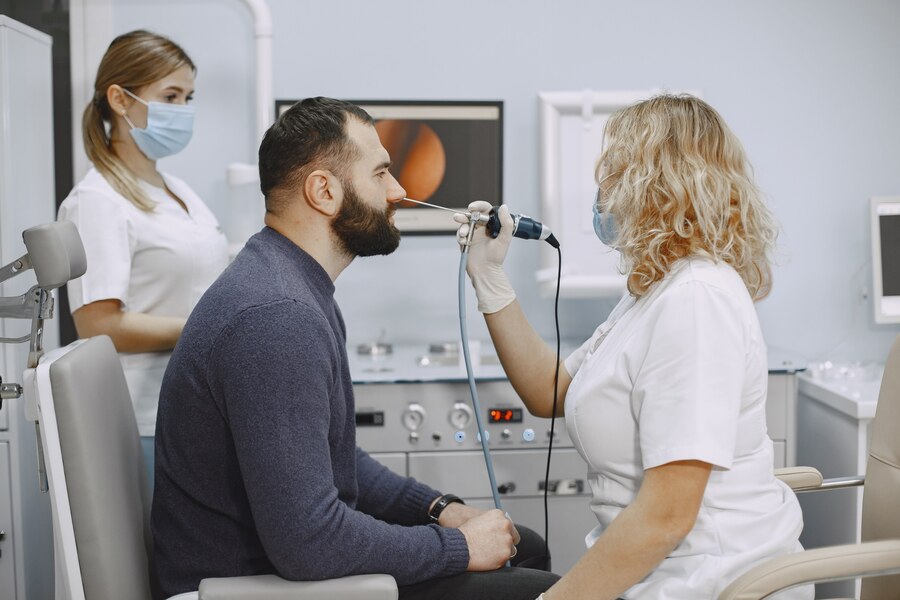
May 12, 2023
The burden of paperwork is slowly burning the joy and passion of practicing medicine these days. And ENT specialists are no exception to it. The weight of administrative paperwork on ENT specialists is crazy heavy and is driving burnout. Paperwork is part of patient care. There is no denying. But for many physicians, particularly ENT specialists, paperwork is a growing and soul-destroying burden. They lament that they spend more time in front of their computer documenting care than they actually spend with patients. We know that paperwork isn’t going to go away. But that doesn’t mean we can’t take a skeptical eye on what needs to be done to control it. There is no magic solution to get rid of the administrative and paperwork burden placed on ENT physicians. But there are ways to help ENT physicians ease this burden. Hiring a medical scribe is one such way. Read on to learn more.
What does an ENT scribe do?
ENT scribes are those professionals who receive the special training and education to help ENT specialists with documentation. Virtual ENT scribes can perform documentation in parallel with the visit, enter ICD-10 and CPT codes, assist with e-prescriptions, keep track of audiograms/hearing tests, help with aftercare instructions and prepare referral letters as directed by the ENT physician. By having a certified ENT medical scribe to help with the documentation tasks can allow the ENT physicians to take their time to understand their patients’ problems and come up with a treatment plan that will bring lasting relief. It is important to note, that ENT practices that have successfully implemented a scribe program have seen a 33% improvement in their clinic efficiency.
Are ENT scribes linked with reduced burnout?
The COVID-19 pandemic took a major toll on physicians both at work and beyond practicing medicine, and ENT specialists were no exception. According to the Medscape otolaryngologist lifestyle, happiness and burnout report published in the year 2022, 37% of the ENT physicians reported feeling burned out. Did you know what led to their burnout the most? Too much time spent on bureaucratic tasks such as paperwork and charting consistently topped the list of burnout causes. 76% of ENT specialists reported that they work day in and day out on bureaucratic tasks. But what should they be actually focusing on, administrative tasks or treating patients? And when the dilemma occurs there is always a trade-off somewhere. Patient get far less attention as the ENT physician has to focus on documenting the care as well. It’s impact? It not only negatively impacts the care process, but more importantly lowers job satisfaction, decreases efficiency, and even results in medical errors. So anything that gets in the way of patient care needs to be done away with. Taking medical scribe support can ease the administrative burden that drives burnout.
ENT scribes improve work-life balance
Long, unpredictable days and piles of paperwork are some of the realities that come with the territory. ENT physicians had to stay back after clinic hours just to complete the unfinished notes of the day. Some even carried home unfinished charts or came in on their days off in order to complete their patient charts. Few others routinely spent an hour or more in the night just to stay on top of charting. This "pajama time" where ENT specialists spend time catching up with their charting outside clinic hours creates work-life balance issues. They don’t get to eat a family dinner or relax like a normal human being. With a medical scribe to take over the documentation tasks ENT physicians felt less bogged down by documentation demands and spent less time catching up after hours. They were able to get home earlier, enjoy some family time and unwind as well.
ENT scribes restore relationships
Are computers consuming too much time and attention in the exam room? Well, the answer is a big yes. When ENT physicians are busy at the computers and focused at the screens patients feel a 'distance' between them. They did not feel the visit was personal nor felt heard. ENT physicians focus on inputting the information rather than making a connection with the patients. Patients felt that the focus of their appointments had shifted away from them. Lack of eye contact, having the back to the patients and awkward silences ruined physician-patient relationships. We are aware that a better physician-patient relationship means better care and better outcomes. With a computer positioned in front of them, gets in the way of their conversation and their relationship. Having a medical scribe to document care allows ENT specialists to focus their full attention on the patient throughout the visit without having to input patient data into the computer.
Paperwork and administrative burden tops the list of challenges that ENT physicians face in practicing medicine. Do you feel that computers take too much time and attention in the exam room? Do you feel distracted and not fully present with the patient in front of you? That is not fair for anyone. It's time to take documentation assistance from the medical scribes. Scribe4Me has a team of certified otolaryngology medical scribes who can help you decrease paperwork burdens and distracting administrative tasks to entirely focus on the patient in front of you. For more information on our ENT medical scribing services visit www.scribe4me.com.

Please fill out this form.
We will reach out to you within 24 hours

Thomas Kennedy

Thomas Kennedy

Documentation is an important daily clinical responsibility. In order to optimize patient care, physicians are always on the lookout for new ways to effectively and efficiently document patient visits.
The use of virtual medical scribes has become increasingly popular in the recent years, as medical practices across the country are on the constant lookout for ways to reduce clinical documentation overload, thereby improving overall productivity.
The clerical burden associated with EHR usage is attributed as the number one cause of physician burnout. We also know that physicians spend twice as much time on EHRs and other clerical tasks compared to the time providing patient care.